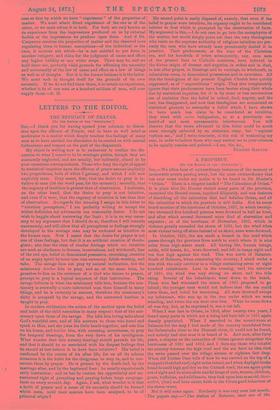LETTERS TO THE EDITOR.
THE EFFICACY OF PRAYER.
[TO THE EDITOR OF THE " SMIOTI,TOR.1
thank you for having opened your columns to discus- .sion upon the efficacy of Prayer, and to have so well acted as moderator in a matter which deeply touches the feelings of many men as to have enabled the discussion to be carried on with mutual forbearance and respect on the part of the disputants.
My object in writing now is to endeavour to confine the dis- cussion to what I conceive to be strategic points, though they are -commonly neglected, and are usually, but indirectly, aimed at by _your numerous correspondents. Those who deny the right of appeal to statistical inquiries upon the efficacy of prayer assume implicitly two propositions, both of which I gainsay, and which I will now -explicitly state. They assert, first, that the desire to pray is in- tuitive to man (let the word pass, for the moment) ; secondly, that the cogency of intuition is greater than of observation. I maintain, en the other hand, that the desire to pray is not intuitive, and even if it were, that the cogency of intuition is less than that -of observation. As regards the meaning I assign in this letter to "intuitim perceptions," I am perfectly willing to accept the videst definition my adversaries can reasonably desire. I do not Irish to haggle about narrowing the limit ; it is in no way neces- sary to my argument that I should do so, therefore I will concede -enormously, and will allow that all perceptions or feelings strongly -developed in the average man may be reckoned as intuitive to the human race. Now I assert that the desire for prayer is not one of these feelings, but that it is an artificial creation of theolo- 'gime ; also that the class of similar feelings which are intuitive are such as obedience to dreams, incantations, and witchcraft, fear of the evil eye, belief in demoniacal possession, exorcising, coercion of an angry spirit by some tom-tom ceremony, fetish-worship, and • tabu. The savage does not pray by natural inclination, but the missionary teaches him to pray, and as, at the same time, he .preaches to him on the existence of a God who listens to prayer, 'precept to pray is a logical sequence of that instruction. The savage believes in what the missionary tells him, because the mis- aionary is avowedly a more instructed man than himself in many 'things, and he is certainly in earnest, therefore the missionary's -deity is accepted by the savage, and the converted heathen is -taught to pray.
In modern civilisation the action of the mother upon the belief and habit of the child resembles in many respects that of the mis- aionary upon those of the savage. She tells him loving tales about 'God's watchful care, and of His answers to those who kneel and speak to Him, and she joins his little hands together, and sets him -on his knees, and teaches him, with caressing earnestness, to pray 'for temporal blessings, from the very dawn of his intelligence. What wonder that this nursery theology should pervade his life, -and that it should be so associated with his deepest feelings that lie should at last believe it to .have been intuitive? His belief is confirmed by the events of his after life, for on all its solemn occasions it is the habit for the clergyman to step in, and to con- secrate them by prayer. He is present by the death-bed, by the marriage altar, and by the baptismal font ; he Initially superintends early instruction ; and he has by custom the opportunity and un- restrained right of preaching and praying before large congrega- tions on every seventh day. Again, I ask, what wonder is it that a habit of prayer and a sense of its necessity should be formed which seem, until their sources have been analysed, to be of primeval origin?
My second point is easily disposed of, namely, that even if the belief in prayer were intuitive, its cogency ought to be considered inferior to that which is prompted by the observation of facts. My argument is this,—I do not care to go into the metaphysics of the matter, but would simply point out that the very theologians who insist on the supreme authority of religious intuition are pre- cisely the men who have already most prominently denied it in practice. Their predecessors, at the time of the Christian era, and for hundreds of years subsequently, nay, even men of the present time in Catholic countries, have believed in the divine origin of dreams and auguries, in ordeal and in duel, in lots after prayer, in blessings and in cursings, in witchcraft, in miraculous cures, in demoniacal possessions and in exorcisms. All this the theologians of the present English Church have quietly suppressed, as of " superstitious " origin. They also complacently ignore that their predecessors have been beaten along their whole line by statistical inquiries, for it is by more or less unconscious use of statistics that the belief in ordeal, duel, augury, and the rest, has disappeared, and now that theologians are summoned on statistical grounds to surrender a belief which I have shown to have much less claim to be considered as intuitive, they start with naïve indignation, as at a previously un- heard-of and most unreasonable interference. You will observe that the views advanced in this letter could be much more strongly enforced by an elaborate essay, but " sapienti verb= sat.," and I write concisely, at the risk of weakening my case, in order to induce those who may answer me in your columns to be equally concise and pointed.—I am, Sir, &c.,
FRANCIS GALTON.


































 Previous page
Previous page